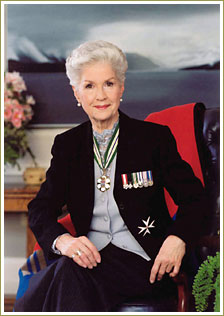Wednesday, June 28, 2006
Tuesday, June 27, 2006
Monday, June 26, 2006
Lieutenant-Governor Iona Campagnolo, Eustonian
 Let's just reflect for a moment upon the words of our beloved commander-in-chief, Lieutenant-Governor Iona Campagnolo -born on Galiano Island, raised in the canneries at the mouth of the Skeena River, and whose names are also Notz-whe-Neah and Saan-naag-Kaawaass - in her welcoming remarks to the World Peace Forum, now underway in Vancouver:
Let's just reflect for a moment upon the words of our beloved commander-in-chief, Lieutenant-Governor Iona Campagnolo -born on Galiano Island, raised in the canneries at the mouth of the Skeena River, and whose names are also Notz-whe-Neah and Saan-naag-Kaawaass - in her welcoming remarks to the World Peace Forum, now underway in Vancouver:The office I hold does not permit personal political views, so you will not hear me discussing Iraq or Afghanistan this evening, but I will say that as a life-long feminist, there can be few women or men of good will on earth who would will the women and girls of Afghanistan back under the institutionalised theocratic misogyny of the Taliban! It is hardly political to note the many shifts in opinions concerning peace that stand as challenges for delegates to this conference to consider. For those on the traditional Left, there is potential for change being exhibited for example by the Euston Manifesto in regard to the road to peace. While I do not expect you to embrace its strategies directly, I do expect that thoughtful reflection be given to the direction it expresses. The manifesto has been created by a membership comprised of democrats and progressives who have set forth a fresh political agenda for the world’s consideration.
In fact, read the whole thing.
The extent to which that speech stands in contrast to the silly, reactionary and plain loopy noises emanating from the forum is absolutely astonishing. And it's odd that I didn't read the lieutanant-governor's comments reported anywhere on the World Peace Forum site. If there was any report of her remarks in the commercial media, besides this, I must have missed it.
Wednesday, June 21, 2006
The Might Of Armies, Magnified A Thousand-Fold
 Capital operates globally, and it has various institutions to carry out its work. So, labour should operate globally as well, and labour unions are right to actively engage in international solidarity campaigns. There’s important work to be done, like eliminating sweatshops, which is something the Canadian Labour Congress has taken on. And if you ask me, these people are bold as bullocks.
Capital operates globally, and it has various institutions to carry out its work. So, labour should operate globally as well, and labour unions are right to actively engage in international solidarity campaigns. There’s important work to be done, like eliminating sweatshops, which is something the Canadian Labour Congress has taken on. And if you ask me, these people are bold as bullocks.But what CUPE-Ontario has been up to is another thing altogether.
When the Ontario section of Canada’s largest union decided last month to sign up to a worldwide, Palestinian-led campaign to boycott Israel, the result was an unholy mess that British Columbia’s largest union is still busy trying to clean up.
“It’s been a little crazy, unfortunately,” a weary Barry O’Neill, president of the 70,000-member B.C. division of the Canadian Union of Public Employees, told me the other day. “It’s gotten to the point where it’s really hateful,” O’Neill said. “And we don’t even agree with what Ontario is saying.”
That’s from my column this week. For which I expect to catch heck.
So’s this:
. . .the term occupation, as it appears in the CUPE Ontario resolution, doesn’t make much sense unless it’s meant to condemn Israel’s existence in what some people prefer to call Palestine.
CUPE Ontario also says the point of the boycott is to force Israel to recognize the right of the Palestinians to self-determination. But Israel already does recognize that right. The resolution further demands that Palestinians be granted the “right of return” to Israel set out in the United Nations Resolution 194. But UN Resolution 194 was passed in 1948, and its intent has been overtaken by events. A Palestinian “right of return” now would pretty well finish off Israel as a distinctly Jewish nation-state.
You can see why some people find the whole thing, well, disturbing.
I expect I might catch heck for the photograph that illustrates this post, too, so let me say it is not intended to invite comparisons between CUPE-Ontario and the Sturmabteilung or anything like that. It’s intended to show why it is not unreasonable to expect a bit of grumpiness among otherwise reasonable people when the words boycott and Jews suddenly show up in the same conversation. There’s a certain history involved.
It hasn’t helped that CUPE-Ontario’s “Boycott Israel” resolution isn’t in aid of anything specifically recognizeable, like a more speedy withdrawal of illegal Israeli settlements in the West Bank. That would be one thing. But it isn’t evidently about that. It’s not about anything immediately obvious, like securing justice for Palestinians workers within their own state, or compelling Israel to a peaceful coexistence with the Palestine Authority, or helping forge solidarity between Israeli and Palestinian trade unions, as in this fine initiative.
It hasn't helped that the resolution appears to be about eliminating Israel entirely.
But nevermind what I think. Let’s hear directly from its sponsors.
Resolution 50, which draws from this, was championed at the May 27 convention by CUPE Local 3903, the faculty union at York University, and Local 3903’s Rafeef Ziadah makes it quite clear here that the scourge the boycott is intended to eliminate is Israel itself - the Jewish, colonial, U.S.-backed “apartheid state” of Israel.
There’s only one difference I can see between this boycott and the Arab League’s antiquated boycott-and-blacklist campaign, launched in 1951, which still sputters and stumbles along. The newfangled version proposes to draw non-Arab countries into it, by pouring the old reactionary wine into new and leftish-looking bottles that Ziadah sets out as the “struggles of women, workers, people of color, immigrants, prisoners, and particularly indigenous peoples.”
I just doubt somehow that the delegates to the CUPE-Ontario convention were fully briefed on what they were getting dragged into. It also seems unlikely that Resolution 50 accords with the rank-and-file view among CUPE-Ontario’s 200,000-or-so members. What I know for sure is that if I were a CUPE-Ontario member, I’d be far more inclined to stand with my brothers and sisters here, but I'd give Daniel Nadler a wide berth. He's got a right to be angry but he's going about things the wrong way. He should get active in his union instead.
Eric Lee from LabourStart actually manages a bit of satire on the subject, by putting the shoe on the other foot.
If that doesn’t work for you, there’s always this.
Saturday, June 17, 2006
Against Misanthropy and Defeatism: Frank Furedi
 How we view humanity really matters. If we insist on seeing humans as morally degraded parasites, then every significant technical problem from the millennium bug to the avian flu will be feared as a potential catastrophe beyond our control. Today’s intellectual pessimism and cultural disorientation distracts the human imagination from confronting challenges that lie ahead. All the talk about human survival expresses a crisis of belief in humanity - and that is why the real question today is not whether humanity will survive the twenty-first century, but whether our belief in humanity can survive it.
How we view humanity really matters. If we insist on seeing humans as morally degraded parasites, then every significant technical problem from the millennium bug to the avian flu will be feared as a potential catastrophe beyond our control. Today’s intellectual pessimism and cultural disorientation distracts the human imagination from confronting challenges that lie ahead. All the talk about human survival expresses a crisis of belief in humanity - and that is why the real question today is not whether humanity will survive the twenty-first century, but whether our belief in humanity can survive it. Despite Western culture’s profound sense of estrangement from its human sensibilities, individuals possess an unprecedented potential for influencing the way they live their lives. It is only now that significant sections of the public have real, meaningful choice and control. We must reinvigorate the belief in autonomy and self-determination, and recognise that we have moved from the Stone Age to a time when people’s transformative potential is a remarkable force.
Frank Furedi is on to something, I think. He does tend to ignore the unavoidable fact that the "ecological footprint" associated with homo sapiens actually is causing both human suffering and the extinction of other species, and actually does bode very ill for the near future. But at least he's not being an auld miseryguts about everything. He's not giving up. He's not writing us off.
Furedi's making an argument that's quite similar to (but much more developed than) the case I've been trying to make about the affairs of the world, so I'm starting to get interested in the guy. Plus, Furedi is one of those humanists over at The Manifesto Club.
No, not that one.
This one.
Friday, June 09, 2006
Mad Dogs, Root Causes, Englishmen, and Fish
 Michael Byers is a very smart guy. He’s been generous with me, too, having helped me sort out some of my own questions about international law and “war law,” which is his field of expertise. Michael makes some very good points today about why Canadians should keep their heads, in the aftermath of last weekend’s arrests of 17 Muslims on terrorism-related charges.
Michael Byers is a very smart guy. He’s been generous with me, too, having helped me sort out some of my own questions about international law and “war law,” which is his field of expertise. Michael makes some very good points today about why Canadians should keep their heads, in the aftermath of last weekend’s arrests of 17 Muslims on terrorism-related charges.I am a little bit troubled by the suggestion that part of the work of keeping our heads, as Byers sensibly advises, is the business of getting at the "root causes" he associates with the alleged plotters. If there is any truth at all to the allegations that they planned to chop off the prime minister's head and blow up the CN Tower, isn't it a bit of a stretch to assume there are any legitimate root causes here, or any legitimate grievances involved at all?
But there are a couple of points Byers makes that I find myself not just objecting to, but recoiling from. I expect it’s mainly because of my Irish-Catholic immigrant background, which is probably what also allows me to not recoil from, but rather feel a deep sense of affinity with, the points Asma Arshad Mahmood makes about the same dilemma that Byers addresses.
Says Mahmood: "I am a very devout Muslim, an extremely old-fashioned Muslim in many ways, (but) I do not believe that the clergy has any right to represent Canadian Muslims in any way," Mahmood said. The primary role of an imam is to conduct prayers and educate people about faith, not to dabble in international politics, she added.
The reason I can so readily relate to what Mahmood says is that it's more or less the Muslim version of my own view of the Catholic clergy, which is that they should visit the sick, bury the dead, administer the sacraments, and shut their yaps.
The thing that bothers me in Byers' article, owing to being a Mick, is this: The IRA taught the British an all-important lesson: If you're fighting to defend your way of life, you mustn't give up your way of life. And this, in aid of the assertion that despite the Irish Republican Army's bombing campaign in England, the British kept their heads: Yes, people were concerned. But they went to work the next day, their rights were not compromised, and people of Irish ancestry and adherents of Catholicism were not collectively blamed.
I'm not so sure one can say that the British, in response to the Irish Republican Army's bombing campaign, were defending their way of life. The Irish Republican Army, for all its failings, was most certainly not at war with the British way of life. And Catholics, specifically Irish Catholics, while never failing to find friends and allies among the English people, suffered terribly from "backlash." Their rights were compromised. The Irish in Ulster, while considered British subjects, were often subjected to the most outrageous treatment. They were imprisoned without trial, and were routinely subjected to torture.
Secondly, for whatever one might say about the ill-advised, barbaric and indeed sometimes "terrorist" aspects of the IRA campaign, it was in aid of a negotiable and finishable agenda, with a clear objective that was broadly supported by democrats and progressives around the world - and in England itself, incidentally. The objective was easily articulated, and was understandable in rational, democratic terms, and it remains the objective of Sinn Fein, which is represented in the British House of Commons: the reunification of the six counties of Northern Ireland with the 26-county Irish Republic.
Another key point is that the IRA, even during its most bloodthirsty periods, always enjoyed fairly significant support from the community on whose behalf it claimed to be fighting.
Clearly and obviously, there is absolutely no evidence that Canada's Muslims support anything vaguely like the ugly terrorist fantasies that have been attributed to the 17 Ontarians arrested last weekend. Indeed, whenever a Canadian Muslim is presented with the opportunity of a microphone and an audience these days, the message is pretty consistent: We're not a bunch of jihadists; and we need your help.
As for the "root causes" of alienation among Muslim youth, wouldn't at least one of those causes be the dunning and incessant lie, so fashionable among the pseudo-left, that the Canadian government is whipping up Islamophobic hysteria while engaging in an illegal and imperialist war of occupation in Afghanistan? If I was a Muslim kid and I allowed myself to believe that, I'd be alienated, too.
Meanwhile, Georgie Monbiot draws a bit of tortured comparison between Iraq and pre-independence Ireland here. This bit is both untrue and nutty: The other side - whether it concerns Ireland, India, Kenya or Malaya - is always inadmissable. The torture and killing of the colonised is ignored or excused, while their violent responses to occupation are never forgotten.
It's nutty because it's such a sweeping generalization. It's untrue because of the overwhelming evidence against it, especially in the case of Ireland (the English have probably done more to recount the story of Britsh atrocity in Ireland than the Irish have). But this, even though it's in aid of a convoluted comparison, redeems the piece: Occupations brutalise both the occupiers and the occupied.
Moving along with convoluted comparisions involving race and ethnicity and stuff, here's my favourite of the week:
If this had been a fishery where, say, only Canadians of English descent were allowed to fish commercially and all other Canadians had to be tied to the dock, this program would have been struck down in a second.
That' s Phil "Race Card" Eidsvik, in response to a unanimous decision by five judges of the British Columbia Court of Appeal that puts to rest the notion that race has anything to do with the fisheries undertaken by the Musqueam, Tsawassen and Burrard peoples.
Those fisheries are not "race-based fisheries." Period.
Eidsvik isn't giving up, though. He expects to take his silly arguments to the Supreme Court of Canada, because: It's pretty darn common sense that when one race can go to work on another day and another race can't - this is discriminatory treatment.
My old pal, Ernie Crey, whose Sto:lo people fish upriver from the Musqueams, sent me this note yesterday, in response: Terry: Don't go to work tomorrow because it's a Sto:lo only workday at your desk.
Hilarious.
Here's the upshot of the judges' decision:
The people of Canada, through the Department of Fisheries and Oceans, are obliged to and are certainly entitled to issue communal fishing licences to certain aboriginal communities in order to allow them to conduct their fisheries in a lawful, orderly way. If we feel like it, we can also draw up the licences in such a way that fishermen in those communities can sell their fish if they feel like it.
Certain belligerents in the commerical fishing industry who don't like this can't stop us from doing this. And the fact that aboriginal fishing communities might be said to come from a "particular race" has nothing to do with anything. These folks could be pink, purple, orange or spotted or striped for all we care. It's irrelevant. They are Canadians. Their ancient communities also happen to be vested with constitutionally-protected fishing rights, arising from their customs, traditions, and practices. It's the old English common law way of figuring out what "rights" are.
If Canadians would like to be able to buy some of the fish caught in those aboriginal fisheries, then Canadans can see to it that the aboriginal communal licences allow the sale of fish. That is the way things are done in a democracy governed by the rule of law.
With the tiniest bit of luck, one effect of this ruling will be to dissuade eejit reporters and editors from allowing the inflammatory and mischievous and inaccurate term "race-based fishery" to show up in headlines and news copy about aboriginal fisheries.
It's a fiction. And an ugly one. It should stop.
Stopping ugly and hateful speech isn't easily done by law, though.
I'm thinking of this guy.
I'm also thinking of this kind of thing, which alleges that the "Stop Genocide in Darfur" campaign is really a Zionist plot, aided by Yankee evangelicals. And is really all about oil.
Monday, June 05, 2006
How the World Got To Be The Way It Is
There aren't many reviews that I'd anticipate with worry, but when I heard that Stan Persky was going to write something about my book for Dooney's Cafe once he'd settled back down in Berlin, it was the tiniest bit nervous-making. I shouldn't have worried, of course, because Stan is so damn generous and gracious in everything he does. Of course, it would be a thoughtful and careful and serious essay. It's Stan, after all. But the weird thing about that guy is that he always gets, exactly, what I'm trying to do, even if I don't do it all that well.
Not that everybody's happy with me today. Writing in the Globe and Mail ("The Manifesto and Marx"), Angus Taylor writes:
The Euston Manifesto promoted by Terry Glavin (Shake It To The Left -- June 3) is presented as a bold reassertion of progressive political values intended to reinvigorate an enervated left that has lost its way. What we get instead is a laundry list of things we should all be against (evil dictators, racism, and suicide bombers) and things we should all be in favour of (democracy, human rights, and, uh, open-source software).
But the fundamental failing of the Euston Manifesto goes beyond its simplistic "Saddam bad, U.S. good" logic. The manifesto presents neither a coherent analysis of the world's problems nor any plan for solving them. One does not have to be a Marxist to believe that the role of capitalism, an economic system that requires endless growth and is eating the planet alive, at least needs to be addressed. The manifesto does not even mention the word.
That's a good summation of a consensus that's emerging in certain quarters about how the manifesto should be greeted: 1. Be snide. 2. Dismiss it as a mere laundry list. 3. Criticize it for not doing things it doesn't set out to do in the first place.
"One does not have to be a Marxist" to type "euston manifesto" and get 328,000 hits on Google today, either. But now I'm being snide.
Taylor might profit (sorry, dirty word) from reading this.
Saturday, June 03, 2006
A new world, from the ashes of the old
 The decision to sign the Euston Manifesto was pretty easy for me, when I considered the company I would be obliged to keep. In the manifesto's authors and in its signatures, I recognized a pretty trustworthy crowd.
The decision to sign the Euston Manifesto was pretty easy for me, when I considered the company I would be obliged to keep. In the manifesto's authors and in its signatures, I recognized a pretty trustworthy crowd.There is Norm Geras, Marxist scholar and emeritus professor at Manchester University; left-wing Independent columnist Nick Cohen; Paul Berman, author of Power and the Idealists; Marc Cooper of the venerable U.S. magazine The Nation; Francis Wheen, a foremost authority on Karl Marx; historian Marko Attila Hoare; poet George Szirtes; Wellesley professor and Journal of Human Rights editor Thomas Cushman; Dissent editor Michael Walzer; and on and on.
The Canadian list made the decision even easier. Its signatures show a healthy cross-section of academics, writers and activists. They include anthropologist Nadia Khouri, Toronto student activist Nav Purewal, Ontario gay-rights leader Jim Monk, Concordia University social-work professor Amiel Pariser, McGill sociology professor Axelvan den Berg, Jack Cunningham of the Inuvik library board, Vancouver punk-rock writer/blogger Simon Harvey, University of Toronto philosophy professor Paul Franks, and many others.
Ms. Khouri was unequivocal about her reasons for signing: "The radical left's negative reaction to the whole question of humanitarian intervention, their tolerance for post-colonial tyrants and hereditary dictators, their sick 'root cause' explanations of terrorist butcheries of innocent civilians, their pathological anti-Americanism. I'm also stunned at the Western feminists' betrayal of their oppressed sisters in Muslim countries."
But will the Euston Manifesto change anything?
McGill's Axel van den Berg says he thinks so. He considers the manifesto a kind of "revolt," and, at the very least, he says, "a strong reassertion of some universal perspective is very encouraging."
The University of Toronto's Paul Franks is convinced the manifesto's authors are on to something: "It hit a nerve," Prof. Franks says. "This is a conflict. It's a conflict over identity and tradition, and there are people who do not want to be put into a position where they have to defend these principles."
He had no qualms about those principles, his obligation to defend them, or which side he was on. So he signed.
"Besides," he says, "it's just good to know there are some kindred spirits out there."
That's from my essay in today's Globe and Mail about the Euston Manifesto. I'd put the link here except you need to register, but our comrade Norm Geras has put up a condensed version of the piece on his fine page, here.







